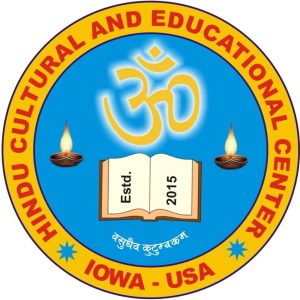Hindu Cultural and Educational Center

CONTACT
HOURS
ETIQUETTE
Meets every Saturday evening from 6 PM – 8PM
Remove your shoes before entering
Do not point your feet at others or sacred objects
Student Testimonial
Someday, Des Moines’ Hindu Educational and Cultural Center will have its own temple and cultural center on East Army Post Road. For now, though, they hold their weekly services in the basements of their members’ homes, usually in the Easter Lake area of Des Moines.
How they got to the Easter Lake area of Des Moines is a long and complex story. Although they were citizens of Bhutan, the Buddhist government of Bhutan persecuted them for their Hindu religion and Nepali language under the “One Nation, One People” policy that mandated the Buddhist religion and the Bhutanese language. When persecution turned to ethnic cleansing, these Nepali-speaking Bhutanese fled Bhutan for Nepal, where they were denied entry and instead kept in UNHCR-run refugee camps. After over a dozen years in these camps, the Bhutanese refugees were finally resettled to the U.S. and elsewhere. Many of the Bhutanese refugees now living in Des Moines first relocated to Seattle. But Iowa’s job opportunities and low cost-of-living eventually attracted them to Des Moines.
Here in Des Moines they gather every Saturday evening for a weekly bhajan service—worship through song and dance that, for now, is held in the basements of their homes. Although the location changes weekly, the services are the same. In each basement, there is a shrine adorned with statues of Hindu deities, offerings of fruit and flowers, and burning incense. And on the walls, there are posters of many more Hindu deities, most notably Lord Krishna, the god of love and compassion, who is a favorite for most members of the community. Priests sit at the front of the room, performing music on harmoniums, drums, and other percussion instruments. But the hymns can be led by anyone—sometimes the priests, other times those laity who can sing in Nepali, Hindi, or Sanskrit. And everybody claps and dances. For most songs, participants dance in small groups of 2–4, but at the end of the service everyone rises and dances. The bhajan then ends with an offering of flame to the deities (aarti) and an offering of sanctified food to the congregants (prashad).
The bhajan is not just a celebration; it is the practice of religion free from persecution, says Tanka Dhital, the president of the Hindu Cultural and Educational Center. Someday, this practice will occur in a temple on a plot of land on East Army Post, which the community has already purchased. But before they build this temple, the Hindu Cultural and Educational Center will build a community center so they can provide cultural opportunities and refugee services to anyone in need. Currently, they offer such opportunities and services in space provided by Lutheran Services in Iowa (LSI)—everything from classes in Nepali and Sanskrit, to education in Nepalese culture and Hindu religion, to citizenship preparation, garden plots, and ESL classes. But the Hindu Cultural and Educational Center longs for their own temple and cultural center, where they can practice not only their own religion and culture but also hospitality to all of Des Moines, just as they themselves were once welcomed by Des Moines.

